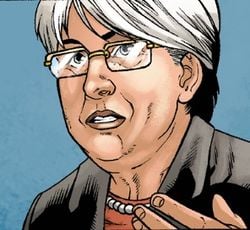Unified Earth Government
From Halopedia, the Halo wiki
| Unified Earth Government | |
|---|---|
 The symbol of the UEG
| |
| Government overview | |
|
Type: |
|
|
Head of state: |
|
|
Executive branch: |
|
|
Legislative branch: |
|
|
Government branches: |
Colonial Administration Authority
|
| Societal overview | |
|
Capital: |
|
|
Official language(s): |
English, and many others |
|
Official religion(s): |
Multi-religious |
|
Currency: |
|
|
Tier 3[1] | |
| Historical overview | |
|
Formation: |
|
|
Reorganized: |
2170: Reconstituted into a governing body[7] |
The Unified Earth Government (UEG)[Note 1] is the central civilian government that administrates over Earth and its colonies throughout a portion of the Orion Arm of the Milky Way galaxy. It encompasses the Colonial Administration Authority (CAA), the United Nations (UN), and the United Nations Space Command (UNSC).[8]
Initially conceived as a supranational entity on Earth in 2075,[5][6] the UEG was reconstituted into a governing body in 2170[7] before gaining full autonomy from the UN in 2204.[5] It would also begin governing colony worlds beyond the Sol system until the 2400s. Many Outer Colonies and some Inner Colonies began to doubt the idea of the UEG due to UNSC interference.[2] This came to a head when the Secessionist Union and People's Occupation demanded outright autonomy for a dozen worlds in 2487[10] and eventually violent and open rebellion beginning in 2494.[11]
As the Human-Covenant War was raging, the UNSC assumed the governing function of the UEG in the face of possible extinction from the overwhelming Covenant threat.[8][12][13] The United Nations Space Command ceased functioning as a governing body following the end of hostilities with the now dissolved Covenant Empire. The transfer of power back to the civilian authority of the UEG occurred on January 8, 2553, although no other notable change in the UNSC's political depth within colonial politics was ceded.[9] Dr. Ruth Charet remains the incumbent President of the Unified Earth Government since her inauguration in January 2553.[14]
History[edit]
Origins[edit]
The Unified Earth Government traces its origins back to the early days of human colonization of the Sol system in the late 21st century. It was conceived in 2075 to be under the auspices of the United Nations, a representative, public-facing organization to facilitate extraterrestrial colonial commerce, exploration, and industry.[5][6]
Conflicts between the Frieden movement, the vanguard of Vladimir Koslov, and a coalition of individual UN nations in South America, on Mars, and throughout the Jovian Moons encouraged the Secretariat of the United Nations to officially involve itself in the Interplanetary War with a mandate to stabilize the system and deter further aggression, establishing the United Nations Space Command in 2163.[15]
Persistent and widespread chaos of the decade past would result in the Callisto Treaty of 2170, spurring great reform in support of Earth nationalism. Originally little more than a mere function of the Secretariat, the UEG would begin to see radical change, evolving from a ministry to its present state as a federal executive, legislative, and judicial body, eventually subordinating the United Nations itself. All existing supranational organizations, independent nation and city-states, and their respective territorial possessions and claims on Earth and on extraterrestrial bodies; and all independent planetary and satellite colonies throughout Sol would be subject to the UEG by 2204.[5][7][16]
Domus Diaspora[edit]
- Main article: Domus Diaspora
 This section is a stub. You can help Halopedia by expanding it.
This section is a stub. You can help Halopedia by expanding it.
Insurrection[edit]
As tension between the Inner Colonies and Outer Colonies increased in the late 25th century, the UEG increased the UNSC's military presence in the Outer Colonies to prevent civil unrest. However, this led to increased aggression in the Outer Colonies that eventually led to the Insurrection.[17] Although the civil war largely remained in the Outer Colonies, major Inner Colonies like Tribute and Reach were wracked by Insurrectionist activity throughout the early 26th century.[18][19]
Covenant War[edit]
With the beginning of the Human-Covenant War in February 2525 and the Covenant's systematic annihilation of the Outer Colonies, the UNSC became humanity's greatest protector against the genocidal threat. The UNSC thus overrode the civilian rule of the UEG and established itself as an emergency military government, with the military becoming humanity's primary government.[20] Although the Unified Earth Government was more open to stepping down in this time of crisis, the Colonial Administration Authority resisted the UNSC's drastic rise in power. It was subsequently stripped of its power and influence.[8]
Post-war era[edit]
- "For too many years, humanity was on the backfoot. Reacting to threats, rather than preventing them. Rest of the galaxy was bigger than us. Stronger than us. We were mice, hiding in the shadows, hoping the giants would not see us. No more. Humanity is no longer on the defense. We are the giants now."
- — Captain Thomas Lasky[21]
In January 2553, Dr. Ruth Charet took office as the President of the Unified Earth Government. She called for a new era of peace, progressiveness, and rebuilding in the wake of the Covenant War.[14] The UNSC still did not require the approval of the UEG to assign budgets, however, the UEG was slowly beginning to regain its power and the government began to focus on reconstruction.[22] By January 8, 2553, the Unified Earth Government formally regained its power back from the UNSC.[9] After the UEG formally regained its administrating powers back following the end of the Human-Covenant War, the UNSC experienced difficulty in shedding its former governmental tasks. As a direct result, a shadow government of sorts has formed within the Unified Earth Government—largely directed by the Office of Naval Intelligence and its own bureaus.[1] As the UNSC continues to retain considerable influence on the colonies, many individuals outside the Sol system believe that the UEG is merely an ineffective front for a military government.[5]
The UEG and UNSC moved to retake several colonies that had been abandoned during the war, while others were reterraformed. Draco III held strategic importance during this mission, as many other lost colonies were located beyond the planet.[23] With the UEG stretched it afforded greater autonomy to the megacorporations – approving militarization of their security forces and greater exploitation of colonial subsidiaries in the name of stability and reconstruction.[24] In the years following the war the UEG was involved in minor conflicts against resurgent human insurgencies, Covenant splinter groups, and, in July 2557, the Ur-Didact and his armies of Forerunner Promethean constructs.[25]
In October 2558, the Created and their Guardians took control of Earth and most human colonies.[26] Despite Cortana's defeat over Installation 07 on December 2559, several human colonies are still under Created control, while some of the Outer Colonies have turned to the Banished for inspiration and guidance.[27][28]
Government and politics[edit]
The Unified Earth Government functions as a representative democracy[1] The UEG is headed by a President.[14] The government maintains executive, legislative, and judicial branches.[5] The Unified Earth Government Senate serves as the legislative branch of the government.[4] A number of other executive offices are known to exist, among them the Minister of Information,[29] the Secretary of Defense,[30] and the Minister for the Colonies; the last position is likely part of the CAA.[14] Inferring from the first and last positions, the UEG would appear to be based around a parliamentary system. Other executive ministries include the Department of the Treasury, under which operates the Internal Revenue Service.[31] The Inner Territories Transportation Administration is an agency of the UEG that apparently has authority over the security of public interstellar or interplanetary travel among the Inner Colonies.[32] The UEG also maintains the Cartographic Corps, for the purpose of mapping the stars.[33]
While the UEG is formally a confederation of independently governed worlds,[2] Earth is in a privileged position over the colonies in the election process, which has been a source of discord with some colonials.[13] Some colonies are managed by planetary governors that lead a world's parliamentary government.[34]
The Colonial Administration Authority is the government branch that administers the various colonies that belong to the UEG. It keeps extensive files on every colony world and city under the UEG, available to UNSC members for planning missions.[35]
Even though it originally formed the UEG, the United Nations has been absorbed into a branch of the Earth government by the 26th century.[8] Its role has been reduced to mediating various administrative tasks between Earth's similarly vestigial governing bodies.[36]
The Unified Interstellar Law acts as the overal legal framework for the UEG.[37]
Relations[edit]
Other human factions[edit]
Prior to first contact with the Covenant at Harvest in 2525, the Unified Earth Government kept no foreign relations with the exception of battles against Insurrectionists on rebellious colonies, whose independence the UEG did not recognize.[38][39] However, after the Covenant War, tensions remain as the UEG must again deal with elements of the weakened Insurrectionist movement, with worlds like Venezia actively seeking to secede.[40] The United Rebel Front has proven to be one of the most organized and effective insurgent factions to the UEG's power, throughout the 26th century and even continuing to be a formidable force and significant threat after the Covenant War. The URF has successfully managed to take control of several UEG colonies—at least temporarily—during and after the war, including Victoria,[41] Talitsa,[42] and Terceira.[43] However, the UEG generally left the URF alone, unless the group attempted to violently secede a world from its control.[23] Some Outer Colonies maintain a tense relationship with the Unified Earth Government,[1] as they felt abandoned by their government and its military branch during the Human-Covenant War.[44] While some colonies attempt to withdraw from the UEG through violence, others are slowly attempting to become autonomous and end all dependence on the government by forming their own militaries.[45] The UEG and UNSC is constantly on alert for radical independence movements seeking to take advantage of these power vacuum.[1]
Swords of Sanghelios[edit]
As of 2553, the UEG maintains its earlier truce with the Swords of Sanghelios under the leadership of Arbiter Thel 'Vadam, which serves as the diplomatic face of the Sangheili as a whole. An official peace treaty was ratified between the two governments in February of 2553, signed by 'Vadam and Fleet Admiral Lord Terrence Hood.[46] By 2558, Rear Admiral Horatio Temkin was in charge of the diplomatic relations to Sanghelios.[47] Joint Occupation Zones were established between the UEG and Swords of Sanghelios to administrate regions of space cooperatively between the two governments.[48]
Other species[edit]
By March 2553, the UEG had no formal treaty with the Kig-Yar,[49] though trade continued between the two species.[50] The UEG and Swords of Sanghelios attempted to make peace with the Children of Oth Sonin in 2558, but these peace talks were disrupted by a mercenary group.[51][52] By 2558, the UEG had formal diplomatic relations with the Unggoy government on Balaho, complete with embassy.[53]
Economy[edit]
The UEG uses the United Nations Credit (cR) monetary unit to organize its economic stability by selling or buying military equipment, supplies and costs for shipping, etc.[54] The UN cR was likely implemented by the United Nations at some point before the formation of the Unified Earth Government in 2170. For transporting food and raw materials between colonies, the UEG maintains a merchant navy, run by the Department of Commercial Shipping.[55]
Trade between colonies is seemingly managed and regulated by the Trade Alliance.[56] The Inner Colonies often relied on the Outer Colonies for resources. While Inner Colonies like Reach, Mars, or Tribute served as military strongholds with strong industrial capacities, the Outer Colonies generally provided mining and agricultural supplies.[57] This precedent became troublesome for the UEG after most of the Outer Colonies were destroyed in the Covenant War, leading to Inner Colonies being required to produce their own resources.[58] Outer Colonies suffered from increased trade restrictions and taxes that were established by the Colonial Military Authority, factors that eventually led to the Insurrection.[17] Trade with one colony could be halted through a vote, as was the case with Aleria when the Inner Colonies halted trade with the world during its economic collapse caused by a century-long drought.[59][60]
Military[edit]
- Main article: United Nations Space Command
The United Nations Space Command is the UEG's primary military, exploratory, and scientific arm. The UNSC is intended to protect colonists and colony worlds from attack by pirates, Insurrectionists and other threats, such as the Covenant. It includes various special forces, and militia organizations but is composed primarily of five branches: the Marine Corps, the Navy, the Army the Air Force, and the recently formed Spartans. The UNSC also maintains a number of scientific organizations, among them UNSC Astrophysics,[61] while the UNSC Engineering Corps is devoted to surveying viable planets for colonization or terraforming.[62] At several times during the Insurrection and for a majority of the Human-Covenant War, the UEG had given the UNSC operational autonomy.[63]
The UEG's member nations maintain their own standing militaries. It is unclear how they are maintained in relation to the UNSC. Prospective members of the Orbital Drop Shock Troopers are drawn from the ranks of national special operations groups as well as from the UNSC's own special forces.[64] The UEG also employs its own naval forces for policing, including police cutters roughly similar in role to those of the Covenant Zanar-pattern light cruiser.[65]
Sphere of influence[edit]
Colonies[edit]
- Main article: Human colonies
Human-occupied systems are known to encompass a relatively wide radius of the Orion Arm of the Milky Way galaxy, in various stages of colonization, from the well developed Inner Colonies to the relatively recent and struggling Outer Colonies. By 2490 there were over 800 worlds under human control, ranging from small outposts and settlements to thriving colonies and military strongholds.[16] Most of the colonies under the influence of the UEG were under the direct governance of the Colonial Administration Authority.[8] Originally military oversight for the colonies was provided chiefly by the Colonial Military Authority, though the UNSC eventually usurped its duties due to widespread corruption in the CMA's ranks.[66] The UEG's and UNSC's rapid colonial expansion efforts led to a massive, unexpected setback at the dawn of the Human-Covenant War.[1]
Influence over these worlds was greatly reduced by the Covenant during the war, with only Earth and a few scattered colonies left mostly intact by the end of the conflict in 2552. Since the end of the conflict the UEG has worked to restore its galactic territories and avoid secessionism and has even recolonized some of its former worlds, including Reach.[67]
Nation-states[edit]
There are still numerous national governments on Earth and other planetary bodies that fall under the UEG's power.[64] They appear to maintain a limited degree of independence, although their overall authority is negligible as most governing functions are handled by the UEG.[68] Earth's territorial governments in particular are overseen by the now largely vestigial United Nations.[36]
|
Asia Oceania Americas |
Europe |
Trivia[edit]
Both the Unified Earth Government and the United Nations Space Command are references to the human government (United Earth Government) and military (Unified Earth Space Council), respectively, from Bungie's Marathon series.
Gallery[edit]
List of appearances[edit]
Notes[edit]
- ^ The UEG is referred to as the "United Earth Government" in some sources, including the directory sheet accompanying Dr. Halsey's personal journal and the Aft Armory Notice within the Infinity Briefing Packet.
Sources[edit]
- ^ Jump up to: a b c d e f g Halo Waypoint: Humans
- ^ Jump up to: a b c Halo Encyclopedia: The Definitive Guide to the Halo Universe, Humans - Colonization, p. 42-43 (2011)
- ^ Halo: Glasslands, page 70
- ^ Jump up to: a b Hunt the Truth, Episode 007
- ^ Jump up to: a b c d e f g h i Halo Waypoint: UEG
- ^ Jump up to: a b c Halo 4: The Essential Visual Guide, page 229
- ^ Jump up to: a b c Halo Mythos, Rise of Humanity, The Interplanetary War, page 51
- ^ Jump up to: a b c d e f Halo Story Page: Frank O'Connor/Robt McLees Interview - August 2008
- ^ Jump up to: a b c Halo Waypoint: Catalog Interaction (Query Answer: Human records indicate transition to noncombatant administrative control [ref: UEG] [January 8, 2553]. No notable adjustment in military [bureaucratic tactical] behavior and scope of authority.)
- ^ Halo Mythos, p. 55
- ^ Halo: Evolutions - Essential Tales of the Halo Universe, The Impossible Life and the Possible Death of Preston J. Cole
- ^ Bestiarum
- ^ Jump up to: a b YouTube: Halo: From A to Z with Frank O'Connor
- ^ Jump up to: a b c d Halo: Glasslands, page 43
- ^ Halo Encyclopedia (2009 edition), page 42
- ^ Jump up to: a b Xbox.com, Halo Storyline: (Additional copy on HBO Forums) (Retrieved on Apr 24, 2008) [local archive] [external archive]
- ^ Jump up to: a b Halo: Evolutions, "The Impossible Life and the Possible Death of Preston J. Cole", pages 428-429
- ^ Halo: Contact Harvest, page 127
- ^ Halo: Contact Harvest, page 81
- ^ Halo: Mortal Dictata, page 456
- ^ Halo 4, Infinity introductory cinematic
- ^ Halo: Glasslands, page 355
- ^ Jump up to: a b Halo: New Blood, pages 19-22 (Google Play edition)
- ^ 1/22/2016: Armory Amore
- ^ Halo 4
- ^ Halo 5: Guardians
- ^ Halo Infinite, Armor Hall: Mercury - Helmet Description "Adapted from what could be interpreted of the strange records recovered from a Created data archive, MERCURY may be a glimpse into an unsettling future being built on occupied UEG worlds."
- ^ Halo Infinite, Armor Hall: Champion - Helmet Description "Long abandoned by the UNSC and forgotten by Earth, the Outer Colonies have turned to the Banished for inspiration and guidance."
- ^ Halo 2, Metropolis: Image:Metrosign-8.jpg
- ^ Halo 2, campaign level Metropolis: File:Metrosign-3.jpg
- ^ http://transmit.ilovebees.com/outbound/taxes_suck.wav
- ^ Hunt the Truth, Episode 5
- ^ Halo Infinite, Emblem: UEG Cartographic Corps description "Mapping the future."
- ^ Halo: Contact Harvest, page 115
- ^ Halo: The Fall of Reach, page 177
- ^ Jump up to: a b Halo Waypoint: Query Answer: Human records indicate that the assembly (ref: United Nations) is a vestigial organization responsible for adjudication of administrative tasks between territorial sectors on Erde-Tyrene.
- ^ Halo: Shadows of Reach, chapter 13
- ^ Halo: The Fall of Reach
- ^ Halo: Contact Harvest
- ^ Halo: Glasslands, page 175
- ^ Halo: Ghosts of Onyx, page 31
- ^ Halo 4, Wetwork Armor description
- ^ Halo 4, Oceanic Armor description
- ^ Halo: Nightfall, Soldier Within
- ^ Halo Waypoint: Sedra
- ^ Halo: Glasslands, page 60
- ^ Halo: Escalation, Issue #5
- ^ Halo Waypoint: Catalog Interaction - Page 14
- ^ Halo: The Thursday War, page 4??
- ^ Halo: Glasslands, page 113 and page 261
- ^ Halo: Escalation, Issue #1
- ^ Halo: Escalation, Issue #3
- ^ Halo: Bad Blood, chapter 3
- ^ Halo: Contact Harvest, page 43
- ^ Halo: Contact Harvest, page 24
- ^ Halo: Nightfall, Rhoen Border Security
- ^ Halo Encyclopedia: The Definitive Guide to the Halo Universe, page 299
- ^ Halo: The Cole Protocol, page 29
- ^ Halo: Nightfall, ONI: Trade Barriers
- ^ Halo Waypoint: Canon Fodder - Second to None
- ^ Halo: The Fall of Reach, page 138
- ^ Halo: Ghosts of Onyx, page 123
- ^ Halo Waypoint: UNSC
- ^ Jump up to: a b Bungie.net: Halo 3: ODST Field Guide
- ^ Halo: Warfleet, p. 72-73
- ^ Halo Encyclopedia: The Definitive Guide to the Halo Universe, page 69 (2011)
- ^ Halo: Reach, campaign level, Lone Wolf
- ^ Halo: Contact Harvest, page 37
| ||




